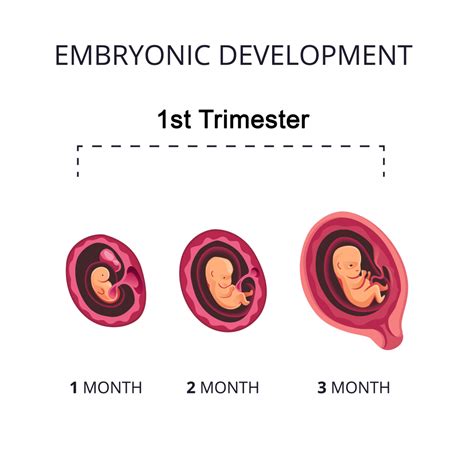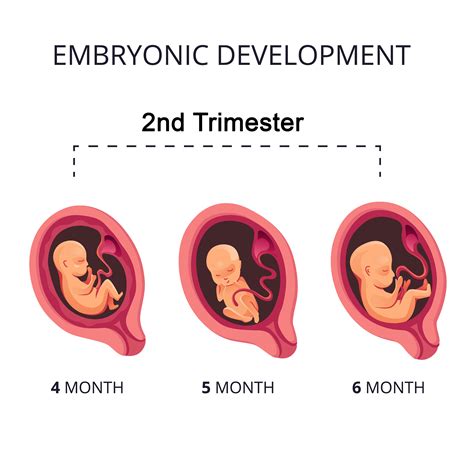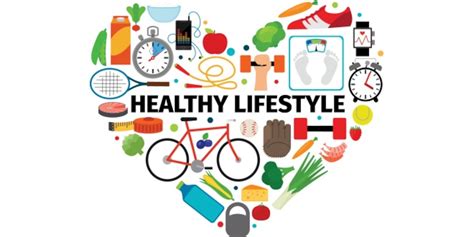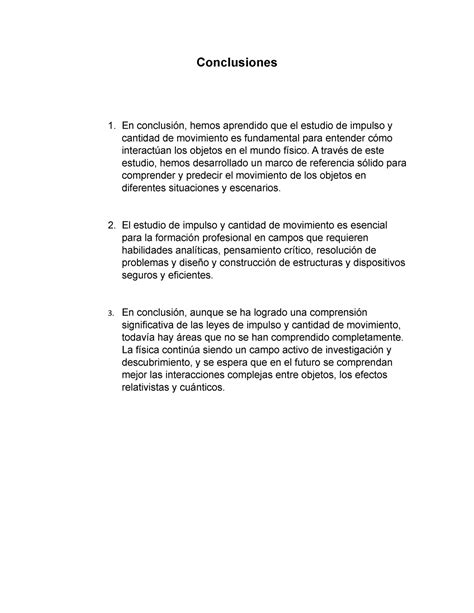Intro
Pregnancy guide: Navigate each trimester with expert advice, covering fetal development, prenatal care, and pregnancy symptoms, for a healthy journey from conception to birth.
Pregnancy is a life-changing experience that brings about numerous physical, emotional, and lifestyle changes. Understanding the different stages of pregnancy is crucial to ensure a healthy and happy journey for both the mother and the baby. The pregnancy period is divided into three trimesters, each lasting approximately 13 weeks. In this comprehensive guide, we will delve into the details of each trimester, exploring the physical and emotional changes, nutritional requirements, and essential check-ups.
As the pregnancy progresses, the mother's body undergoes significant transformations to support the growing fetus. The first trimester is a critical period of fetal development, during which the foundation for the baby's major organs and body systems is laid. The second trimester is often referred to as the "golden period" of pregnancy, as the morning sickness and fatigue of the first trimester subside, and the mother starts to feel more energetic and comfortable. The third trimester is the final stretch, during which the mother's body prepares for labor and childbirth.
The journey of pregnancy is unique to each individual, and it's essential to stay informed and prepared for the challenges and joys that come with it. Whether you're a first-time mother or have experienced pregnancy before, this guide will provide you with valuable insights and practical tips to navigate each trimester with confidence.
First Trimester: Week 1-12

Some key milestones of the first trimester include:
- Week 5-6: The baby's heart starts to beat, and the major organs begin to develop.
- Week 7-8: The baby's limbs, fingers, and toes start to form.
- Week 9-10: The baby's digestive system starts to practice contractions, preparing for life outside the womb.
- Week 11-12: The baby's senses, including sight, hearing, and taste, start to develop.
Nutritional Requirements
A well-balanced diet rich in essential nutrients is crucial during the first trimester. Key nutrients include: * Folic acid: essential for preventing birth defects of the brain and spine. * Iron: vital for the production of red blood cells and preventing anemia. * Calcium: necessary for the development of the baby's bones, teeth, and muscles. * Protein: essential for the growth and development of the baby's tissues.Second Trimester: Week 13-26

Some key milestones of the second trimester include:
- Week 13-14: The baby's skin starts to thicken, and fat layers form.
- Week 15-16: The baby's pancreas starts to produce digestive enzymes.
- Week 17-18: The baby's nervous system starts to mature, and reflexes develop.
- Week 19-20: The baby's senses, including sight and hearing, become more refined.
Check-Ups and Tests
Regular check-ups and tests are essential during the second trimester to monitor the baby's growth and detect any potential complications. Some key tests include: * Ultrasound scans: to monitor the baby's growth and development. * Blood tests: to check for gestational diabetes and anemia. * Group B strep test: to detect the presence of group B strep bacteria.Third Trimester: Week 27-40

Some key milestones of the third trimester include:
- Week 27-28: The baby's lungs start to mature, and surfactant production increases.
- Week 29-30: The baby's bones start to harden, and the skin thickens.
- Week 31-32: The baby's digestive system starts to practice contractions, preparing for life outside the womb.
- Week 33-34: The baby's brain and nervous system mature, and reflexes become more refined.
Preparing for Labor and Childbirth
As the due date approaches, it's essential to prepare for labor and childbirth. Some key steps include: * Creating a birth plan: to outline your preferences for labor and delivery. * Attending childbirth education classes: to learn about the labor process and parenting skills. * Practicing relaxation techniques: to manage pain and anxiety during labor.Staying Healthy and Happy

Building a Support Network
A strong support network is essential for navigating the challenges of pregnancy and parenthood. Some key steps include: * Building a relationship with your healthcare provider: to establish trust and open communication. * Connecting with other expectant mothers: through online forums, support groups, and social media. * Involving your partner and family: in the pregnancy journey and preparation for parenthood.Conclusion and Next Steps

We invite you to share your thoughts, experiences, and questions in the comments below. Join our community of expectant mothers and parents to connect, learn, and grow together.
What are the most common symptoms of the first trimester?
+The most common symptoms of the first trimester include morning sickness, breast tenderness, and fatigue. Hormonal fluctuations can also cause mood swings, food cravings, and aversions.
How often should I attend prenatal check-ups during the second trimester?
+It's recommended to attend prenatal check-ups every 4-6 weeks during the second trimester. However, your healthcare provider may schedule more frequent appointments based on your individual needs and health status.
What are the key signs of labor and childbirth?
+The key signs of labor and childbirth include contractions, back pain, and a bloody show. As labor progresses, the contractions become more frequent and intense, and the cervix dilates and effaces.
